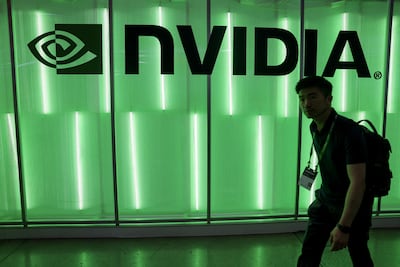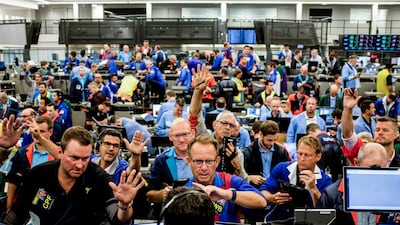Nvidia beat estimates in its second-quarter earnings on Wednesday, but investors were unimpressed by the AI chip maker's outlook.
The AI bellwether reported revenue of $30.04 billion, compared with expectations of $29 billion. Revenue was up 122 per cent from a year ago and 15 per cent from the previous quarter. The company's profits surged 166 per cent to $16.6 billion.
But its third-quarter forecasts failed to meet analysts' lofty expectations.
Nvidia said it expects to post revenue of $32.5 billion next quarter, plus or minus 2 per cent. The average analyst forecast had estimated a revenue of $31.77 billion, with expectations topping at $37.9 billion.

“Everybody is pretty used to seeing phenomenal results,” said Peter Andersen, founder of Andersen Capital Management.
“And unless everything is perfect, there is, of course, some downside to that. And so maybe one could argue at the highest level that it was less than perfect this time.”
Shares in the company fell more than 7 per cent in after-hours trading.
Expectations were high heading into Wednesday's report, and its results could weigh heavily on other semiconductor companies, which have led this year's stock market rally on AI optimism.
“Investors were not impressed by the comfortable revenue beat that Nvidia announced last night – a seventh consecutive quarter beat and the fifth consecutive quarter beat of $2 billion,” Ipek Ozkardeskaya, senior analyst at Swissquote Bank, said on Thursday.
“The actual results and the forecast beat the average market expectations by a great margin and there was nothing the company could do more to keep the enthusiasm going … but they fell short of the highest estimates on Wall Street.
“And when I say ‘highest estimates’, I am talking about third-quarter revenue forecast from some analysts of nearly $38 billion, for example, which is off chart but which is also the reason why Nvidia’s stock price could challenge odds and rumours that it was maybe overvalued.”
Nvidia also noted there were some issues with its Blackwell chip production, saying it changed the Blackwell GPU mask to “improve production yield”. The company said it expects to ship “several billion dollars in Blackwell revenue” in the fourth quarter.
“Hopper demand remains strong and the anticipation for Blackwell is incredible,” Nvidia chief executive Jensen Huang said during an earnings call.

Ms Ozkardeskaya said Nvidia's “shiny” results were clouded by the delay of the next-generation Blackwell chip and “the rising worries that competition will soon arrive to tap into Nvidia’s monstrous market share – that stands near 80 per cent for the advanced chips”.
Nvidia had to delay the launch of its next generation Blackwell chip due to issues in design and manufacturing.
“Even though the company has enough popular chips to sell, the delay of the Blackwell chips could alter their own predictions for the quarters ahead and discourage investors,” Ms Ozkardeskaya said.
Nvidia holds 6.67 per cent of the S&P 500's portfolio, meaning any large swings in the company's share prices have an outsized effect on the market. It also has a more than 8 per cent weighting in the Nasdaq 100 components.
That weight came into fuller view this month during a global equities rout and Wall Street's rebound. The S&P 500 recovered $4 trillion as US recession fears subsided within three weeks, with Nvidia shares climbing more than 28 per cent.
Analysts including those at the Bespoke Investment Group believe Nvidia earnings and Mr Huang's remarks could rival Federal Reserve announcements as the most significant financial news.
Mr Andersen cautioned against putting so much weight behind one company.
“I think that it's a very flawed way to view the market,” he said.
Data centre revenue was $26.27 billion, up 154 per cent year on year and 16 per cent sequentially. Tech companies such as Apple, Google, Meta and Microsoft all rely on Nvidia's chips and data centres as they invest more in AI.
“Nvidia achieved record revenue as global data centres are in full throttle to modernise the entire computing stack with accelerated computing and generative AI,” Mr Huang said.
However, Nvidia faces rising competition from the likes of AMD, Qualcomm and Intel, according to Ms Ozkardeskaya. “The rising competition will start eating into the profit margins sooner rather than later,” she said.
Ms Ozkardeskaya added that the mounting worries cannot be ignored regarding the Big Tech companies’ “massive AI spending that has not improved these companies' profitability just yet”.
“Even though Big Tech companies have enough cash on hand to increase their capex spending on AI – and they insist they would rather overspend than risk jeopardising their dominance – if investors start pulling out, they may be forced to scale back their spending plans, which poses a risk for AI enablers like Nvidia” she said.

